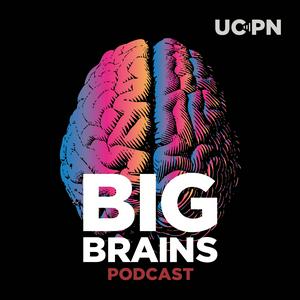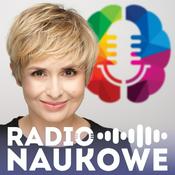210 odcinków

The Breakthrough Quantum Sensor That Sees Inside Your Cells, with Peter Maurer
08.01.2026 | 35 min.
What if we could precisely measure a cell at its most fundamental level? In this episode, we talk with the University of Chicago scientist Peter Maurer about how he and his colleagues made the breakthrough discovery of turning a protein found in living cells into the first biological quantum bit, also known as a qubit.Maurer explains how quantum systems—once thought to be too fragile for real-world use—are becoming some of the most powerful sensors ever built, and what they could teach us about the brain, the body and more. Hosted by Simplecast, an AdsWizz company. See pcm.adswizz.com for information about our collection and use of personal data for advertising.

How to Manifest Your Destiny with the Late James Doty
29.12.2025 | 31 min.
We've all heard the phrase "Manifest Your Destiny" when it comes to wanting a new promotion, figuring out a new career path or just trying to achieve that long-term goal. It turns out that the act of manifestation is not merely pseudoscience—it actually has a body of research in neuroscience to back it up.James Doty was a clinical professor of neurosurgery at Stanford University, and founder and director of the Center for Compassion and Altruism Research and Education. He wrote several books, including Mind Magic: The Neuroscience of Manifestation and How It Changes Everything. Hosted by Simplecast, an AdsWizz company. See pcm.adswizz.com for information about our collection and use of personal data for advertising.

What Makes Music Go Viral—From AI to Taylor Swift
11.12.2025 | 35 min.
The internet and social media have transformed the way in which we hear and understand music today—and online communities and platforms from YouTube to TikTok have changed how music circulates and ultimately goes viral. Why do some pop stars have more success creating hit songs and building online following than others?In this episode, we speak with Paula Clare Harper, a musicologist and assistant professor at the University of Chicago. Harper co-edited the book Taylor Swift: The Star, The Songs, The Fans, which explores the online musical cultures that produced and propelled the image of megastar Taylor Swift. Harper unpacks how gendered narratives around "the fangirl" continue to influence which musical practices we take seriously—and how studying music on the internet helps us understand contemporary cultural power. Hosted by Simplecast, an AdsWizz company. See pcm.adswizz.com for information about our collection and use of personal data for advertising.

How Wearable Tech Will Heighten Our Senses and Abilities, with Pedro Lopes
24.11.2025 | 38 min.
Can you imagine a world in which a wearable device, like a smartwatch, could move your fingers to strum the guitar or play the drums? That kind of technology is part of the innovative research coming out of the Human-Computer Integration Lab at the University of Chicago, led by renowned computer scientist Pedro Lopes. His lab is developing a new generation of gadgets that use haptics (or tactile sensations like the buzz of your smartphone) to move your body, replicate your sense of smell and even make you feel things.In this episode, Lopes explores the potential of wearable devices to transform our future as well as brain-computer interfaces that are being developed by companies like Elon Musk’s Neuralink that directly into the body. Hosted by Simplecast, an AdsWizz company. See pcm.adswizz.com for information about our collection and use of personal data for advertising.

Why Are More Women Saying No To Having Kids? With Peggy O'Donnell Heffington
13.11.2025 | 32 min.
More and more women in the United States are saying no to motherhood. In 2023, the U.S. fertility rate reached the lowest number on record. But the idea of non-motherhood is actually not a new phenomenon, nor did it come out of the modern feminist movement. For centuries, women have made choices about limiting births and whether or not to become mothers at all. This history is documented in a new book, "Without Children: The Long History of Not Being a Mother," by University of Chicago Assistant Instructional Professor Peggy O'Donnell Heffington.Heffington writes about the historic trends of non-motherhood as well as the modern factors that are playing a role in women's choices to not have children today — from lack of structural support in the workplace, to a national law for paid maternity leave, and the sheer lack of affordability. She writes that if these trends continue, American millennials could become the largest childless cohort in history. Hosted by Simplecast, an AdsWizz company. See pcm.adswizz.com for information about our collection and use of personal data for advertising.
Więcej Edukacja podcastów
O Big Brains
Słuchaj Big Brains, Przemek Górczyk Podcast i wielu innych podcastów z całego świata dzięki aplikacji radio.pl

Uzyskaj bezpłatną aplikację radio.pl
- Stacje i podcasty do zakładek
- Strumieniuj przez Wi-Fi lub Bluetooth
- Obsługuje Carplay & Android Auto
- Jeszcze więcej funkcjonalności
Uzyskaj bezpłatną aplikację radio.pl
- Stacje i podcasty do zakładek
- Strumieniuj przez Wi-Fi lub Bluetooth
- Obsługuje Carplay & Android Auto
- Jeszcze więcej funkcjonalności


Big Brains
pobierz aplikację,
zacznij słuchać.










